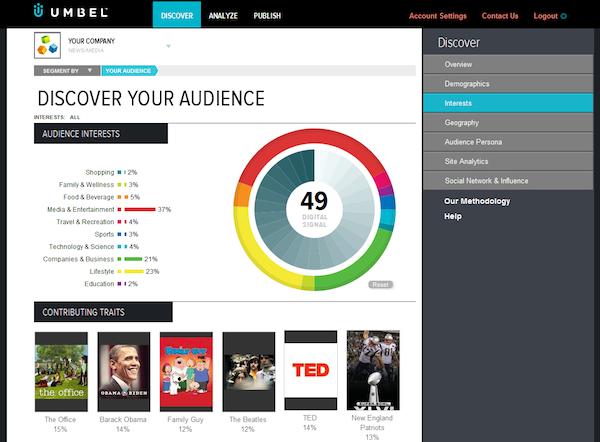

It’s a question every publisher asks: Who is my audience? It’s a question that can guide your editorial decisions and affect what advertisers you attract. Umbel, a technology company based in Austin, is trying to develop a kit publishers can use to extract a richer set of data about their audiences. And they just got funding through the Knight Foundation.
The Knight Enterprise Fund, Knight’s venture investment arm, recently took part in a $3.7 million Series A funding round for Umbel. The specific investment amount was not disclosed. This is the third project Knight has invested in as part of its $10 million fund for media innovation. Ben Wirz, director of business consulting for the Knight Foundation, told me the foundation was interested in Umbel because of its potential to help make for- and nonprofit media more sustainable through better data. “Traditional publishers have a hard time identifying what it is the audience is responding to in their content,” Wirz said. “Umbel brings scalable ways of doing that.”
The company describes its product as a combination of old-school market research and new-school web analytics. Imagine a scenario where a publisher is able to cross-reference a reader’s profile on their news site with information gathered through social media profiles and other online behaviors. The product, still in private beta, triangulates all the signals we leave around the Internet to try to create a unified picture. You can see how this would be useful to a news outlet that wants to better tailor its content for readers or simply needs better ammunition to raise their CPMs. (And you can see how it might raise the hackles of privacy advocates.)
“I think really our core value proposition is to enable publishers to take value of their inventory and give them data that is more precise,” said Paul Krasinski, Umbel’s CEO. The value return comes from reducing reliance on ad networks to sell inventory at lower rates and take a cut out of the revenue, Krasinski said. With the data provided by Umbel, a publisher has more nuanced information to take directly to advertisers. And they can do so without relying on audience surveys, which invariably rely on a small sample size and often yield little more than basic demographic information.
Umbel aims to build on the work done by companies like Nielsen or Arbitron and merge it with web analytics like Omniture as well as information gathered through social channels. The output is something better than just a sheet of pageviews, time-on-site stats, or generic demographic background on readers age 18-34 with income that ranges from $50,000 to $200,000. Instead, Umbel can tell you what percentage of readers in a given geographic area engage with a product at what time of day. If a reader on your site spends their time at Starbucks and talks a lot about their Subaru on other networks, Umbel can gather that information.
“It’s as if we’re conducting a real-time survey of the audience without actually asking them questions,” H.O. Maycotte, Umbel’s CTO told me. “They never see Umbel.”
As promising as the process sounds, it’s the type of thing that sets off alarms for people worried about online privacy and unwanted information sharing. Krasinski said Umbel only builds its data from profiles that publishers have collected or have been given permission to access by users. Essentially, they’re looking for people who link their user registration with networks like Twitter and Facebook. Krasinski said they anonymize the profiles they collect. Once they have the data, it’s only available to publishers, he said.
Maycotte is the former chief technology officer for the Texas Tribune, an organization well known for its efforts to include more data in its journalism. But Maycotte said the Tribune was like many media organizations that have a difficult time applying the same level of ingenuity to collecting information on their audience. News organizations have an added leeriness when it comes to gathering — or being perceived as gathering — information about their readers, Maycotte said. That sets journalism apart from other industries that have no problem being more aggressive when it comes to user data. “I think in general for the media, having access to technology and being a technology organization, versus being a content and media organization — there is a balance,” he said.
Coming from the Tribune, Maycotte has a special appreciation for the predicament of nonprofit news outlets, which often don’t have much margin for error when it comes to making sponsorships and advertising work. Because a number of nonprofits are trying a membership model, what could make Umbel useful is the ability to build a robust profile of the membership to see what content they respond to and what events they enjoy. In that way, it could be predictive and create better fundraising opportunities.
What Umbel offers sounds promising, but it’s still in private beta, which makes it hard to evaluate. The people concerned with giving data to publishers first have to collect a little data on themselves. At the moment, they’re adding new staff (thanks to the investment from Knight and others), as well as finding news partners to test their platform. What Krasinski and Maycotte hope to do is put some power back in the hands of news organizations when it comes to online advertising. That’s more than a little ambitious.
“At the end of the day, this is all about publisher empowerment,” Maycotte said. “They have been at a disadvantage for some time from digital information.”